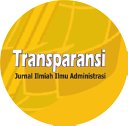Analisis Kualitas Layanan Publik Berbasis Digital di Jakarta: Metode E-Governance Quality (E-Govqual) dan Importance Performance Analysis (IPA)
DOI:
https://doi.org/10.31334/transparansi.v7i2.4236Keywords:
Kualitas Layanan Publik, Jakarta Kini (JAKI), E-Govqual, IPA AnalysisAbstract
Jakarta Kini (JAKI) merupakan inovasi layanan publik yang dilakukan oleh Pemprov DKI Jakarta. Sebagaimana governansi digital (e-government), aplikasi ini dibuat untuk efisiensi dan efektifitas kinerja pemerintah dalam memberikan kualitas layanan prima dan untuk memastikan bahwa aplikasi ini berfungsi dengan baik dan sesuai dengan harapan pengguna. Penelitian ini bertujuan untuk mengukur dan menganalisis kualitas layanan berbasis digital tersebut dengan menilai empat dimensi e-Government Quality (e-Govqual) dan dikombinasikan dengan metode Importance Performance Analysis (IPA). Jenis penelitian ini adalah kuantitatif. Teknik pengumpulan data dilakukan dengan metode survei daring dan responden dipilih dengan cara sample acak sederhana (simple random sampling). Hasil penelitian ini menunjukkan bahwa aplikasi JAKI masih kurang memenuhi harapan pengguna. Kemudian berdasarkan analisis IPA, hanya ada empat atrinut yang menjadi prioritas layanan JAKI yaitu; struktur tampilan yang mudah dipahami, fitur yang terorganisir dengan baik, informasi yang ditampilkan sudah sesuai dengan kebutuhan pengguna, dan Informasi yang ditampilkan selalu terkini.References
Pranitasari, D., & Sidqi, A. (2021). Analisis Kepuasan Pelanggan Elektronik Shopee menggunakan Metode E-Service Quality dan Kartesius. Jurnal Akuntansi Dan Manajemen, 18(2), 12 - 31. https://doi.org/10.36406/jam.v18i02.438.
Wisudawati, N., Irfani, M. G., Hastarina, M., Santoso, B. (2023). Penggunaan Metode Importance-Performance Analysis (IPA) Untuk Menganalisis Kepuasan Masyarakat Terhadap Pelayanan Administrasi Kependudukan Kecamatan Lengkiti. INTEGRASI Jurnal Ilmiah Teknik Industri, 8(1), 32-39. https://doi.org/10.32502/js.v8i1.5969.
Amalia, I. S., Risanti, C., Winata, R. H., Kurniawan, H. (2022). Analisis Kualitas Layanan E-Government Menggunakan E-GovQual dan Importance Performance Analysis. Jurnal Information System & Artificial Intelligence, 2(2), 118-124.
Napitupulu, D., (2016). Analisa Kualitas Layanan E-Government dengan Pendekatan E-Govqual & IPA. Jurnal Penelitian Pos dan Informatika, 6(2), 153-168. DOI : 10.17933/jppi.2016.060203.
Nautami, D., Wahid, F. (2019). Penerapan Metode e-Govqual Untuk Mengevaluasi Kualitas Layanan Aplikasi e-Filing Oleh Wajib Pajak. Prosiding Seminar Nasional Geotik, ISSN: 2580-8796, 325-334.
Jatmiko, A. & Legong, G. (2023). Analisis Kualitas Pelayanan Akses Informasi E-Health Menggunakan Metode E-GovQual. Jurnal Informatika Polinema, 10(1), 69-76. 10.33795/jip.v10i1.1478.
Septa, F., Yudhana, A., Fadlil, A. (2019). Analisis Kualitas Layanan E-Government dengan Pendekatan E-GovQual Modifikasi. Jurnal Sistem Informasi Bisnis, 02, 157-164. DOI : 10.21456/vol9iss2pp157-164.
Ammas, M. A. M., Alfianshah, A. F., Tarigan, A. E., Gunawan, A., Idham, M. F. A. (2023). Transformasi Pelayanan Publik Melalui E-Government (Studi Kasus Implementasi Aplikasi Jaki). Jurnal Penelitian Ekonomi Manajemen dan Bisnis (JEKOMBIS), 2(2), 140-149.
Fadilla, Z., Taqwin., Ketut, M., Ardiawan, N., Eka, M., Ummul, J., Abdullah, K., Jannah, M. (2023). Metodologi Penelitian Kuantitatif.
Subiyanto, R. F., Guffari, M. A., Saputra, A. A., Nurdin. (2024). Mengkaji Dampak Implementasi Aplikasi JAKI Terhadap Aksesibilitas Pelayanan Publik di Kota Jakarta. Indonesian Journal of Social Development, 1(4), 1-14. https://doi.org/10.47134/jsd.v1i4.2801
Wirawan, V. (2020). Penerapan E-Government dalam Menyongsong Era Revolusi Industri 4.0 Kontemporer di Indonesia, Jurnal Penegakan Hukum dan Keadilan (JPHK), 1(1), 1-16. Doi: 10.18196/jphk.1101
Papadomichelaki, X. & Mentzas, G. (2009). A Multiple-Item Scale for Assessing E-Government Service Quality. 163-175. 10.1007/978-3-642-03516-6_14.
Chacón-López, H. (2021). Increased creative production in Spanish university students of Education.
Thinking Skills and Creativity, 41(June). https://doi.org/10.1016/j.tsc.2021.100908
Habibah, F. N., Setiadi, D., Bahri, S., & Jamaluddin, J. (2022). Pengaruh Model Problem Based Learning berbasis Blended Learning terhadap Keterampilan Berpikir Kritis Peserta Didik Kelas XI di SMAN 2 Mataram. Jurnal Ilmiah Profesi Pendidikan, 7(2b), 686–692. https://doi.org/10.29303/jipp.v7i2b.603
Hatami, F., Tahmasbi, F., & Hatami Shahmir, E. (2017). Critical Thinking Skill: Konsep Dan Inidikator Penilaian. Neuropsychology, 3(8), 85–102. http://clpsy.journals.pnu.ac.ir/article_3887.html
Ho, Y. R., Chen, B. Y., & Li, C. M. (2023). Thinking more wisely: using the Socratic method to develop critical thinking skills amongst healthcare students. BMC Medical Education, 23(1), 1–16. https://doi.org/10.1186/s12909-023-04134-2
Jha, A. K. (2020). Understanding Generation Alpha. PsyArxiv, August. https://doi.org/10.31219/osf.io/d2e8g
Kurniawan, S. J., & Rahman, F. A. (2019). Implementation of Deep Dialogue/Critical Thinking in Guidance and Counseling Services: Critical Role Solutions Improve Thingking Skills on Z Generation. Social, Humanities, and Educational Studies (SHEs): Conference Series, 2(2), 47. https://doi.org/10.20961/shes.v2i2.38545
Lantian, A., Bagneux, V., Delouvée, S., & Gauvrit, N. (2021). Maybe a free thinker but not a critical one: High conspiracy belief is associated with low critical thinking ability. Applied Cognitive Psychology, 35(3), 674–684. https://doi.org/10.1002/acp.3790
Li, Z., Zhou, M., & Lam, K. K. L. (2022). Dance in Zoom: Using video conferencing tools to develop students' 4C skills and self-efficacy during COVID-19. Thinking Skills and Creativity, 46(November 2020), 101102. https://doi.org/10.1016/j.tsc.2022.101102
Liu, Y., & Pásztor, A. (2022). Design and validate the Employer-Employee-Supported Critical Thinking Disposition Inventory (2ES-CTDI) for undergraduates. Thinking Skills and Creativity, 46(February). https://doi.org/10.1016/j.tsc.2022.101169
Mcgill, T., & Bax, S. (2005). Learning IT: Where Do Lecturers Fit? International Journal of Information and Communication Technology Education (IJICTE), 1(3), 36–46. https://doi.org/10.4018/jicte.2005070103
Nasution, N. E. A., Al Muhdhar, M. H. I., Sari, M. S., & Balqis. (2023). Relationship between Critical and Creative Thinking Skills and Learning Achievement in Biology with Reference to Educational Level and Gender. Journal of Turkish Science Education, 20(1), 66–83. https://doi.org/10.36681/tused.2023.005
O'Reilly, C., Devitt, A., & Hayes, N. (2022). Critical thinking in the preschool classroom - A systematic literature review. Thinking Skills and Creativity, 46(August). https://doi.org/10.1016/j.tsc.2022.101110
Rowe, M. P., Marcus Gillespie, B., Harris, K. R., Koether, S. D., Shannon, L. J. Y., & Rose, L. A. (2015). Redesigning a general education science course to promote critical thinking. CBE Life Sciences Education, 14(3), 1–12. https://doi.org/10.1187/cbe.15-02-0032
Sari, R. M., Sumarmi, Astina, I. K., Utomo, D. H., & Ridhwan. (2021). Increasing Students Critical Thinking Skills and Learning Motivation Using Inquiry Mind Map. International Journal of Emerging Technologies in Learning, 16(3), 4–19. https://doi.org/10.3991/ijet.v16i03.16515
Shavkatovna, S. R., & Abdukhamid qizi, A. K. (2021). Developing Critical Thinking In Primary School Students. International Conference on Innovations in Sciences, Education and Humanities, 97– 102.
Ssenyonga, R., Sewankambo, N. K., Mugagga, S. K., Nakyejwe, E., Chesire, F., Mugisha, M., Nsangi, A., Semakula, D., Oxman, M., Nyirazinyoye, L., Lewin, S., Kaseje, M., Oxman, A. D., & Rosenbaum, S. (2022). Learning to think critically about health using digital technology in Ugandan lower secondary schools: A contextual analysis. PLoS ONE, 17(2 February), 1–22. https://doi.org/10.1371/journal.pone.0260367
Sujanem, R., Nyoman, I., Suwindra, P., & Suswandi, I. (2022). Efektivitas E-Modul Fisika Berbasis Masalah Berbantuan Simulasi PHET Dalam Ujicoba Terbatas Untuk Meningkatkan Keterampilan Berpikir Kritis Siswa SMA. Jurnal Pendidikan Fisika Undiksha, 12(2), 181–191.
Szabó, D., & Dani, E. (2022). Smartphones and social media as status symbol of Gen Z. Folia Toruniensia, 22, 87–111. https://doi.org/10.12775/FT.2022.005
van Peppen, L. M., Verkoeijen, P. P. J. L., Heijltjes, A. E. G., Janssen, E. M., & van Gog, T. (2021). Enhancing students' critical thinking skills: is comparing correct and erroneous examples beneficial? In Instructional Science (Vol. 49, Issue 6). Springer Netherlands. https://doi.org/10.1007/s11251-021-09559-0
Wu, H. Z., & Wu, Q. T. (2020). Impact of mind mapping on the critical thinking ability of clinical nursing students and teaching application. Journal of International Medical Research, 48(3). https://doi.org/10.1177/0300060519893225
Yu, Z., Hu, R., Ling, S., Zhuang, J., Chen, Y., Chen, M., & Lin, Y. (2021). Effects of blended versus offline case-centred learning on undergraduate nursing students' academic performance and critical thinking ability: A cluster randomised controlled trial. Nurse Education in Practice, 53(May), 103080. https://doi.org/10.1016/j.nepr.2021.103080
Ziatdinov, R., & Cilliers, J. (2021). Generation Alpha: Understanding the Next Cohort of University Students. European Journal of Contemporary Education, 10(3), 783–789. https://doi.org/10.13187/ejced.2021.3.783
Zulkifli, N. N., Halim, N. D. A., Yahaya, N., van der Meijden, H., Zaid, N. M., Rashid, A. H. A., & Hashim, S. (2021). Online Reciprocal Peer Tutoring Approach in Facebook: Measuring Students' Critical Thinking. International Journal of Emerging Technologies in Learning, 16(23), 16–28. https://doi.org/10.3991/ijet.v16i23.27451
Downloads
Published
Issue
Section
License

This work is licensed under a Creative Commons Attribution-ShareAlike 4.0 International License
Please find the rights and licenses in Transparansi : Jurnal Ilmiah Ilmu Administrasi By submitting the article/manuscript of the article, the author(s) agree with this policy. No specific document sign-off is required.
- License
The commercial use of the article will be governed by the Creative Commons Attribution license as currently displayed on Creative Commons Attribution-ShareAlike 4.0 International License.
2. Author(s)' Warranties
The author warrants that the article is original, written by stated author(s), has not been published before, contains no unlawful statements, does not infringe the rights of others, is subject to copyright that is vested exclusively in the author and free of any third party rights, and that any necessary written permissions to quote from other sources have been obtained by the author(s).
3. User Rights
Transparansi : Jurnal Ilmiah Ilmu Administrasi spirit is to disseminate articles published are as free as possible. Under the Creative Commons license, Transparansi : Jurnal Ilmiah Ilmu Administrasi permits users to copy, distribute, display, and perform the work for non-commercial purposes only. Users will also need to attribute authors and Transparansi : Jurnal Ilmiah Ilmu Administrasi on distributing works in the journal and other media of publications.
4. Co-Authorship
If the article was jointly prepared by more than one author, any authors submitting the manuscript warrants that he/she has been authorized by all co-authors to be agreed on this copyright and license notice (agreement) on their behalf, and agrees to inform his/her co-authors of the terms of this policy. Transparansi : Jurnal Ilmiah Ilmu Administrasi will not be held liable for anything that may arise due to the author(s) internal dispute. Transparansi : Jurnal Ilmiah Ilmu Administrasi will only communicate with the corresponding author.
5. Miscellaneous
Transparansi : Jurnal Ilmiah Ilmu Administrasi will publish the article (or have it published) in the journal if the article’s editorial process is successfully completed. Transparansi : Jurnal Ilmiah Ilmu Administrasi editors may modify the article to a style of punctuation, spelling, capitalization, referencing and usage that deems appropriate. The author acknowledges that the article may be published so that it will be publicly accessible and such access will be free of charge for the readers as mentioned in point 3.
Every accepted manuscript should be accompanied by "Copyright Transfer Agreement"prior to the article publication.











